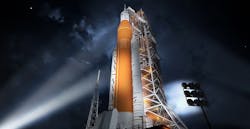Boeing Is Delaying America’s Return to Space, NASA Report Says
Boeing Co.’s construction of the largest rocket in NASA’s history is projected to cost $8.9 billion—double the initial budget. While taxpayer-funded cost overruns are de rigueur when talking about the U.S. military industrial complex, the massive aerospace company is also two years behind schedule, a gap that could widen further, according to an audit by NASA’s inspector general.
The company’s poor performance on the massive Space Launch System means NASA is likely to miss the launch window of December 2019 to June 2020 for its planned Exploration Mission-1, the first flight of the SLS and Orion spacecraft, the report said. The rocket and Orion—being built by Lockheed Martin Corp.—are designed to be America’s new deep-space exploration system, launching first to the moon and eventually deeper into the solar system. Since the end of the space shuttle era, Americans have had to hitch a ride with Russians to get into space.
As of August, NASA has spent $5.3 billion, out of a $6.2 billion budget, for the Boeing contract, and the agency said it expects Boeing to reach the contract’s value by early 2019—albeit without even having delivered the rocket’s core stage. From June 2014 to August of this year, Chicago-based Boeing spent $600 million more than planned on developing Core Stages 1 and 2, and NASA officials confirmed that Boeing spent an additional, unplanned $226 million in the current fiscal year.
What are the reasons for the delay and cost overruns? “Management, technical, and infrastructure issues driven by Boeing’s poor performance,” the inspector general wrote in the report, released Wednesday. NASA “lacks visibility” into the stages’ costs because all three parts of the contract are co-mingled, “contrary to current federal guidance.”
NASA said a launch system as large and complex as SLS “has many unique and difficult challenges” and that it’s working to restructure and renegotiate the core-stage production aspect of Boeing’s contract. “NASA and Boeing are well underway in implementing the report’s recommendations, several of which are already yielding steady and significant improvements.”
The company said in a statement that it had restructured its “leadership team to better align with current program challenges.”
Boeing won the NASA contract in 2012 for two SLS core stages and a later Exploration Upper Stage to boost the rocket’s mass-carrying capacity. The core stage work accounted for more than 40 percent of the $11.9 billion NASA has spent on the SLS through August.
The un-crewed EM-1 mission was initially slated for December 2017; an EM-2 launch with a crew was set for mid-2021. NASA still plans the EM-1 launch in 2020 but concedes that technical and schedule risks could delay the mission. The EM-2 launch will come “no later than 2023,” the agency said in an email.
By Justin Bachman
About the Author
Bloomberg
Licensed content from Bloomberg, copyright 2016.
